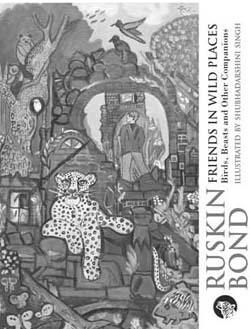For many people living in rural and suburban areas, coming across wild animals is a part of life. Be it that friendly squirrel or the (ever-dwindling) flock of sparrows, or the sinister snake that lives at the end of the garden. However, as urban sprawls expand to swallow up green spaces, these relationships are becoming ever scarcer.
This latest collection of stories by Ruskin Bond describes in typically humorous detail the various friends he made in the natural world while growing up in his beloved Dehra, or as an adult in Mussoorie and other parts of Northern India.
Perhaps a large part of this affinity to wildlife was due to the fact that Bond’s grandfather was a forest officer who had numerous pets. While most would imagine ‘pets’ to refer to dogs or cats, in this case these included a parrot (Popeye), a tiger cub (Timothy), a squirrel (Chips) and an python. The book begins with a journey to Lucknow, with his grandparents and pets. Wildlife laws and those governing train travel were not as strict in those days, and neither were trains as crowded; hence a first class coupe was booked, where the passengers and their pets travelled. What would have been a straightforward journey was considerably enlivened by the python paying a visit to neighbouring coupes and later terrorizing his Aunt Mabel who met them at the station, and who was not charmed by snakes!
For Bond, even a muddy pool in which buffaloes bathed becomes a source of great wonder, and frogs too that subsequently turned into a noisy chorus at home, at an unearthly hour of the morning!
The various aunts who were a part of the author’s life were evidently long-suffering members of the family on account of the assorted animals his grandfather took in. Be it the aforementioned python, or Tutu the monkey who ran off with a pearl necklace and later made her wedding ceremony considerably more memorable!
‘If you are determined, you can find a wilderness close to, no matter where you live.’ The author describes his time in Delhi, where following the influx of refugees after Partition, new colonies were established all over, including Rajouri Garden which, ‘needless to say, had no gardens’. In, ‘A Wilderness in Delhi’, he describes in detail his encounters with the wildlife of Delhi—the blue jays and kingfishers. Surprisingly perhaps, Delhi today still has a fairly rich birdlife that resists the metropolis’s expansion into the hinterland.
While wild animals form the nucleus of this book, we are also introduced to Suzie, the Siamese cat who made friends with the neighbour’s dogs in Mussoorie and was found, at the age of five months, to actually be a male. ‘Her’ name however, remained!

